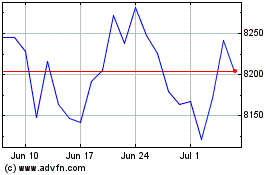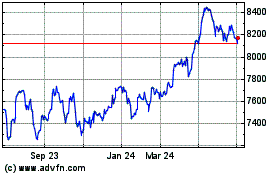EUROPE MARKETS: European Stocks Tumble As ECB Raises Questions About Turkey Contagion
August 10 2018 - 5:23AM
Dow Jones News
By Mark DeCambre, MarketWatch
European stocks got knocked sharply lower on Friday as worries
about spillover effects from an escalating financial crisis in
Turkey knocked eurozone currencies and equity bourses sharply
lower.
What are markets doing?
The Stoxx Europe 600 was down 0.7% to 387.30, after finishing
Thursday's session with a 0.1% gain. With the move, the
pan-European gauge is now on pace for a weekly slide. It's trading
down about 0.5% for the week, pushing the benchmark back into
negative territory for the year.
Germany's DAX 30 traded 1.3% lower at 12,509.77, after booking a
0.3% gain to 12,676.11 Thursday, with the Germany index set for
0.9% weekly decline. Meanwhile, France's CAC 40 fell by 1% at
5,447.78, after ending the previous session little changed at
5,502.25. The French equity benchmark is set for a weekly fall of
about 0.6%. The U.K.'s FTSE 100 slid 0.5% to 7,702.86, after
falling by a similar amount on Thursday, but is clinging to a 0.6%
weekly return.
Meanwhile, the FTSE MIB Italy index declined by 1.3% to
21,349.93 , after declining by 0.7% on Thursday. For the week, the
gauge is on track for a 1.1% fall, while Spain's IBEX 35 retreated
by 1.2% at 9,641.60, after falling by 0.8% the day before. The IBEX
also is on pace for a 1.1% decline.
The euro edged down 0.5% to $1.1553, compared with $1.1610 late
Thursday in New York. The British pound slumped 0.5% to
$1.2756.
What's driving the market?
The tumble for European stocks comes after a report from the
Financial Times
(https://www.ft.com/content/51311230-9be7-11e8-9702-5946bae86e6d)
(paywall) said that the European Central Bank has grown
increasingly concerned about potential contagion from Turkey's
problems, especially in the banking sector.
The news sparked a risk-off atmosphere in EU markets, with
Germany, the largest member of the EU, seeing its stock benchmark
among the more severe declines, and southern European countries,
Spain and Italy, viewed as among the smaller and more vulnerable to
eurozone worries, sliding sharply as well.
The lira , which has been consistently hovering around an
all-time low against the U.S. dollar this summer, fell to a fresh
nadir
(http://www.marketwatch.com/story/dollar-index-jumps-to-around-one-year-high-as-turkeys-lira-gets-rocked-2018-08-10)
and European currencies were also dealt a blow as investors rush
into U.S. dollars.
According to FactSet data, Turkey's lira is down 13.3% this
week, bringing its year-to-date decline to more than 35%.
The euro was down sharply against the dollar, with one buck
changing hands at $1.1453 compared with $1.1526 late Thursday in
New York, while the British pound also took a hit against
greenback. Sterling last bought $1.2758, versus $1.2824
Thursday.
What are strategists saying?
"For some time now investors have been looking at the unfolding
currency crisis in Turkey as a local difficulty, however the
accelerating speed of the declines appears to be raising concerns
about European banks exposure to the Turkish banking system," said
Michael Hewson, chief market analyst at CMC Markets UK.
There are "reports that the European Central Bank is concerned
that some banks in France, Italy and Spain may not be fully hedged
against the precipitous falls in the Turkish Lira through their
exposure to the Turkish banking system, has seen the euro fall
sharply," Hewson said. "If these Turkish banks start defaulting on
their foreign currency loans to these banks in Europe, with Spain's
banks reportedly having the largest exposure, according to the Bank
of International Settlements."
(END) Dow Jones Newswires
August 10, 2018 05:08 ET (09:08 GMT)
Copyright (c) 2018 Dow Jones & Company, Inc.
FTSE 100
Index Chart
From Mar 2024 to Apr 2024

FTSE 100
Index Chart
From Apr 2023 to Apr 2024
